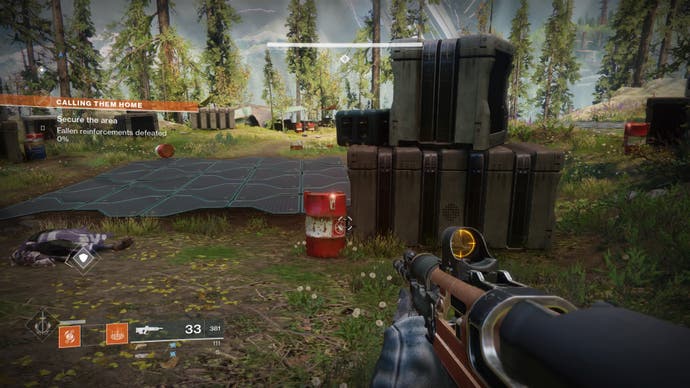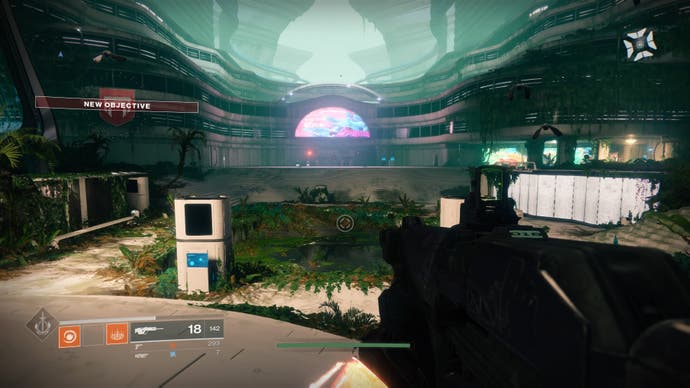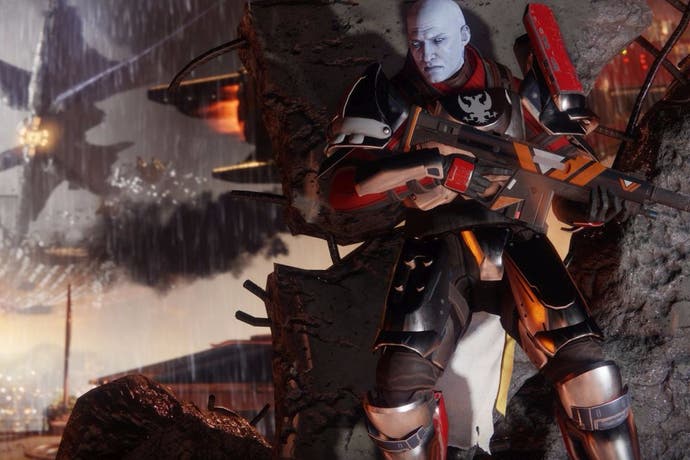Destiny 2 is a lot less annoying, but a lot more of the same
Transversive steps.
There's a wonderful moment in Destiny 2, and it happens before the game's even started. A series of loading screens commemorate some of your finest achievements in the first game, collating beautiful ink work that acts as a tribute to you, the player. It's an artful reminder of the magic the original Destiny was able to weave, as well as a personal invitation to reminisce about the delirious fortnight my own band of brothers spent trying and repeatedly failing to smash through the Vault of Glass before Atheon was finally brought to his knees.
It's a memory that now seems impossibly distant, forged some three years ago before the fruitless grind and a creeping hollowness that was ushered in with each new update would slowly turn me away from Destiny, all while Bungie was clearly buying time as it toiled away on the sequel. Destiny 2 is a tightly designed follow-up to a notoriously fractured game, a multi-million dollar apology to all the fans that endured the growing pains of the series as well as an attempt to smooth out the rough edges so that more might be ensnared in the pursuit of ever escalating numbers for your own personal space wizard.

It certainly works in bringing Destiny's many charms into closer focus. The merry dance between your chosen class's abilities and Bungie's exquisite gunplay is as dazzling as it ever was, the specials and abilities brought together with a bit more purpose. My own warlock now feels like the support class I was sold but never truly delivered in the first Destiny, with helpful heals and buffs to hand via a vastly simplified skill tree. Loot is more plentiful, more varied and more meaningful, the small open worlds of each planet you explore denser and more detailed.
Destiny 2 is a sequel that stays true to the time honoured maxim of bigger and better, all delivered with the utmost opulence. Find a vantage point on Titan, watch the rolling electric seas crashing against cavernous rigs as far as the eye can see while Michael Salvatori's lavish score gently soars and then boggle at the sheer amount of money and workforce that's behind such a vision. This is a production on the grandest possible scale, the art and hard craft that's evident up there with Bungie's very best.
Bungie's gone to great efforts to make sure you marvel at it, too, holding off on the Sparrows that act as mounts until late in the game and forcing you to walk on foot. There are countless distractions to be found along the way, with quest lines that happily consume whole hours or secret loot stashes squirrelled away in some dark corner. It's all so much more convenient than before, with fast travel and a detailed map that marks missions, milestones and incoming public events - putting a small industry of unofficial companion websites that used to perform such services out of business in an instant. A lot of thought has been put into removing the pain and friction that used to exist, and on that front it's been a resounding success.

Yet it can still overshoot itself. One of Destiny 2's promises is a tighter, more coherent narrative throughline, something it no doubt achieves though it'd be hard not to given how low the bar was set by the original. This is, quite pointedly, a story about tearing everything down and starting over again, and in its opening moments it shows that Bungie is as clumsy as ever when trying to elicit emotion; at one point, just after your powers have been stripped, a melancholy score swirls as you punch a pack of dogs and you're handed a sub-machine gun called Sorrow.
That clumsiness has often been part of the hokey charm of Bungie's worlds, though, and this was never going to rival a Naughty Dog production when it comes to a meaningful, engaging story - even if the campaign at one point ill-advisedly cribs from the Uncharted playbook for one particular set-piece. The new cast members are mostly forgettable, save for Gideon Emery doing a turn as Half-Life 2's Father Grigori by way of an English public school with Devrim Kay, but really it's about seeing old favourites Cayde, Savala and Ikora punched up a notch or two.
All of which sums up Destiny 2's approach quite neatly. Burning through the campaign, it's hard to pinpoint what exactly there is that's genuinely new, bar some dogs you can shoot and the addition of exploding red barrels here and there. All of your old favourite enemies are here - the big fat martians! The angry fax machines! - but there are no new additions, no new classes or enemy types, leading to a slightly wearying overfamiliarity to it all. And still, three years on, even in the campaign's finest moments - such as in the sweep and grandiosity of Utopia, a gleaming highlight - this is still a shadow of Halo in its pomp.

It's more of the same - a lot more of the same - which is absolutely fine when that formula proved so popular with so many the first time around, but after three years I was expecting something beyond a handful of quality of life improvements. There's nothing here that will sway the equally large number of Destiny cynics and, right now, not much to inspire a more casual player like myself to get back on the hamster wheel and pour another 200 hours in.
More damningly, perhaps, there's nothing just yet that will stick in the mind three years down the line now that Destiny no longer has the shock of the new. Destiny 2 opens up with a carousel of memories from the original, and then seems content to ride on them for its opening 20 hours. As I look upon the busywork necessary to climb the ranks now I've hit the level cap, I'm still hoping for some new magical moment, or some fresh spark that'll leave its mark. Destiny 2 certainly succeeds in laying down firm foundations, so here's hoping they're still yet to come.









.png?width=291&height=164&fit=crop&quality=80&format=jpg&auto=webp)